Popcorn is a beloved snack that many of us enjoy during movie nights. But can we share this tasty treat with our furry friends? In this article, we will explore whether dogs can have plain popcorn and what precautions should be taken to ensure their safety and well-being.
Key Takeaways:
- Plain, air-popped popcorn is generally safe for dogs to eat in moderation.
- Toppings like butter, oil, and salt should be avoided as they can cause stomach issues in dogs.
- Popcorn kernels can be a choking hazard and should not be given to dogs.
- Popcorn should be treated as an occasional snack, not a regular part of a dog’s diet.
- Consult with your veterinarian before introducing any new treats or snacks to your dog’s diet.
Is Popcorn Safe for Dogs to Eat?
When it comes to sharing snacks with our furry friends, it’s important to know which foods are safe for them to consume. One popular question among dog owners is whether popcorn is a dog-friendly treat. In this section, we will explore the safety of feeding plain popcorn to dogs and discuss the potential risks involved.
Dog-Friendly Popcorn:
Plain, air-popped popcorn is generally safe for dogs to eat in small quantities. It can serve as a low-calorie treat that many dogs enjoy. However, it’s crucial to ensure that the popcorn is free from any toppings such as butter, oil, salt, or other seasonings. These additives can cause stomach upset and other digestive issues in dogs.
Risks of Feeding Popcorn to Dogs:
Feeding popcorn with added butter, oil, salt, or other seasonings can pose health risks to dogs. These toppings can lead to gastrointestinal problems, such as diarrhea or vomiting. Additionally, the high sodium content in buttered and salted popcorn can be harmful to a dog’s health. Therefore, it’s essential to avoid sharing flavored or seasoned popcorn with your furry friend.
Summary:
- Plain, air-popped popcorn is safe for dogs to eat in moderation.
- Avoid giving dogs popcorn with butter, oil, salt, or other seasonings.
- Popcorn should be treated as an occasional snack and not a regular part of a dog’s diet.
In the next section, we will delve into whether dogs can safely consume popcorn kernels and discuss the potential risks associated with them.
Can Dogs Eat Popcorn Kernels? Understanding the Choking Hazard
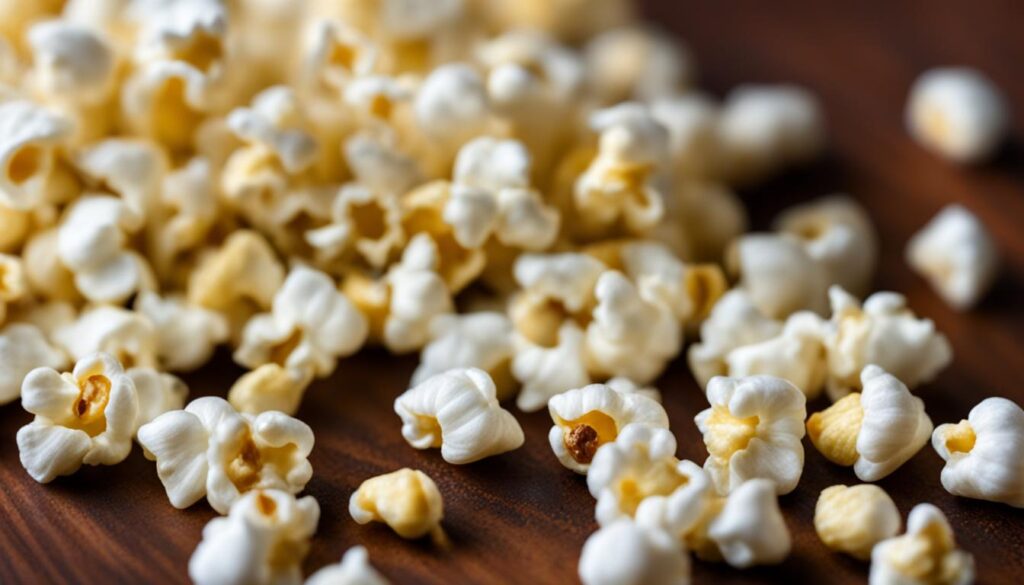
When it comes to feeding popcorn to our furry friends, it’s important to be cautious about the potential hazards that can arise. Popcorn kernels, in particular, pose a choking risk for dogs, and they can also get lodged in their teeth, causing discomfort and potential dental issues. While larger dogs might be able to handle small amounts of kernels without issue, it’s best to err on the side of caution and avoid feeding dogs partially popped or whole kernels altogether.
As responsible pet owners, we understand the importance of ensuring our dogs’ safety and well-being. While popcorn itself can be a tasty treat for dogs in moderation, it’s crucial to prioritize their safety and health. By avoiding popcorn kernels, we can reduce the risk of choking incidents and potential dental problems, ensuring a happy and healthy snacking experience for our beloved pets.
The Risks of Popcorn Kernels for Dogs:
- Choking Hazard: Popcorn kernels can get lodged in a dog’s throat, causing a choking emergency.
- Dental Issues: Kernels can also become trapped in a dog’s teeth, leading to discomfort and potential dental problems.
- Preventive Measures: It’s best to avoid feeding dogs any partially popped or whole kernels to minimize the risk of these hazards.
By being mindful of the potential risks associated with popcorn kernels, we can ensure the safety of our furry friends and provide them with alternative, dog-friendly snacks that won’t pose a choking hazard. Remember to always consult with your veterinarian before introducing any new treats into your dog’s diet to ensure their overall health and well-being.
Health Benefits of Plain Popcorn for Dogs
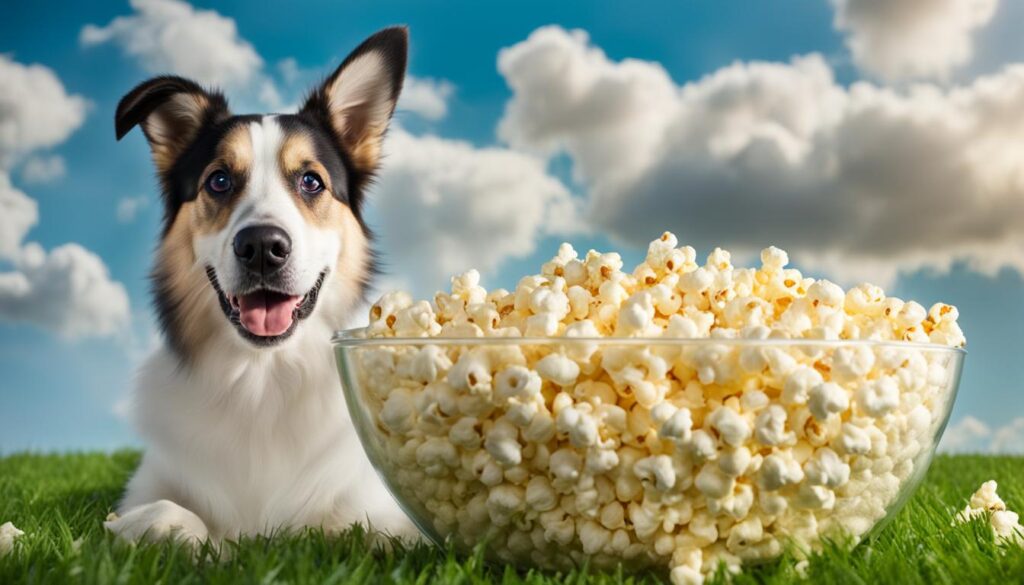
Plain, air-popped popcorn can provide some health benefits for dogs. It contains important minerals such as magnesium, manganese, phosphorus, and zinc, which are essential for their overall well-being. These minerals play a crucial role in maintaining healthy bones, supporting the immune system, and promoting proper bodily functions. Additionally, popcorn is a good source of dietary fiber, which aids in digestion and helps regulate bowel movements.
It’s important to note that while popcorn can offer these health benefits, it should be given to dogs in moderation. The nutrients found in popcorn should already be present in their regular daily food. Popcorn should be viewed as an occasional treat rather than a regular part of their diet. It’s always important to consult with your veterinarian before introducing any new foods or treats into your dog’s diet
The Health Benefits of Plain Popcorn for Dogs:
- Provides essential minerals for overall well-being
- Supports healthy bones and immune system
- Aids in digestion and regulates bowel movements
With proper portion control, plain, air-popped popcorn can be a tasty and nutritious treat for your furry friend. Just remember to skip the butter, oil, salt, or other seasonings and opt for the plain variety. Your dog will surely appreciate the crunchy goodness of popcorn as an occasional indulgence!
Alternatives to Popcorn for Dogs
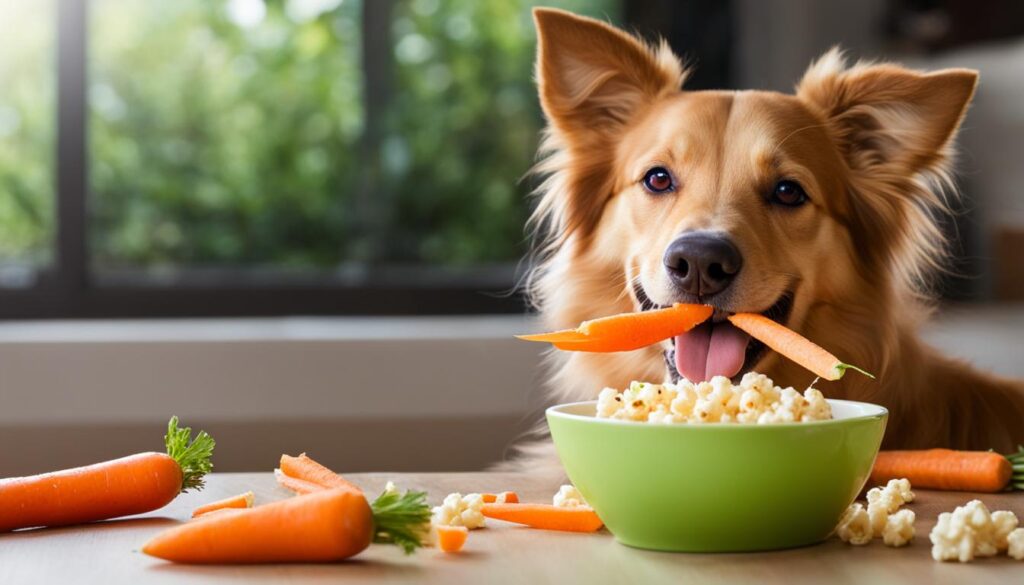
If you’re looking for healthy and tasty alternatives to popcorn for your furry friend, we’ve got you covered! Here are some dog-friendly options that can provide a crunchy and satisfying snack:
1. Carrots
Carrots are a great alternative to popcorn for dogs. They are low in calories and high in fiber, making them a healthy choice. You can serve them raw or cooked, but make sure to cut them into bite-sized pieces to prevent choking hazards.
2. Green Beans
Green beans are another excellent substitute for popcorn. They are rich in vitamins and minerals, and dogs love the crunch! Serve them plain, steamed, or even frozen for a refreshing treat on hot days.
3. Sliced Apples
Apples make a sweet and nutritious alternative to popcorn. Just be sure to remove the seeds and core before slicing them into bite-sized pieces for your furry friend. Apples are a great source of vitamins and antioxidants, providing a healthy snack option.
Remember, when introducing any new food into your dog’s diet, it’s important to check with your veterinarian to ensure it is safe and suitable for your specific dog’s needs. Every dog is different, so it’s essential to consider any allergies or dietary restrictions they may have.
By offering these popcorn alternatives to your dog, you can provide them with a variety of healthy and delicious snacks. Remember to always prioritize your dog’s overall diet and nutritional needs, and use treats like popcorn alternatives as an occasional indulgence. Your furry friend will appreciate the thought and love you put into their snack time!
Guidelines for Feeding Popcorn to Dogs
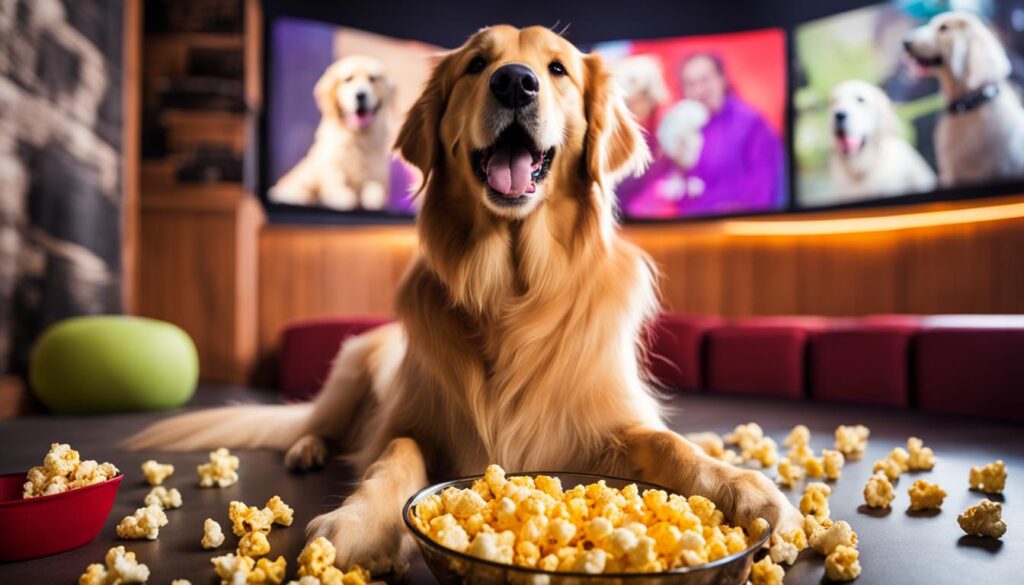
When it comes to feeding popcorn to your furry friend, there are a few important guidelines to keep in mind. By following these tips, you can ensure that your dog enjoys popcorn safely as an occasional treat.
Choose Plain, Air-Popped Popcorn
Opt for plain, air-popped popcorn without any toppings such as butter, oil, or salt. These additions can be harmful to your dog’s health and may cause stomach upset or other digestive issues. Plain popcorn is a healthier option that still provides a satisfying crunch for your pup.
Serve in Moderation
Popcorn should be given to your dog as a treat in moderation. It should not exceed 10% of their daily caloric intake to avoid unbalancing their overall diet. Remember to factor in any other treats or snacks your dog may be receiving throughout the day to ensure they maintain a healthy weight and avoid any nutritional imbalances.
Avoid Whole or Partially Popped Kernels
While plain, air-popped popcorn is generally safe for dogs, it’s important to check for any whole or partially popped kernels. These can pose a choking hazard or get stuck in your dog’s teeth, causing discomfort or potential dental issues. Always check the popcorn before serving it to your furry friend.
By following these guidelines and keeping your dog’s overall diet in mind, you can safely share the joy of popcorn with your canine companion. Remember, moderation is key, and it’s always a good idea to consult with your veterinarian if you have any concerns or questions about feeding popcorn to your dog.
Can Dogs Have Popcorn as a Regular Snack?
While plain, air-popped popcorn can be given as an occasional treat to dogs, it is not recommended to make it a regular part of their snack routine. Dogs should primarily be fed a complete and balanced diet of high-quality dog food to ensure they receive all the necessary nutrients for their overall health and well-being.
Popcorn, even when plain and without any toppings, should only be offered to dogs as a special indulgence from time to time. It is important to remember that popcorn is not a substitute for a nutritious dog food diet and should not exceed 10% of a dog’s daily caloric intake.
Incorporating popcorn as a regular snack for dogs can lead to an imbalance in their nutritional intake and potentially contribute to weight gain or other health issues. Therefore, it is always recommended to prioritize a dog’s overall diet and consult with a veterinarian before introducing any new treats or snacks.
Conclusion
In conclusion, when it comes to popcorn for dogs, it’s important to prioritize their health and well-being. While plain, air-popped popcorn can be a dog-friendly treat, it should be given in moderation and without any toppings or seasonings. Remember, dog-friendly popcorn means keeping it simple!
Feeding dogs popcorn should be a special indulgence rather than a regular snack. Dogs require a balanced diet of high-quality dog food to meet their nutritional needs. Popcorn should complement their diet, not replace it. So, keep those movie nights enjoyable, but make sure your furry friend’s popcorn consumption is limited and balanced.
If you’re ever unsure about whether popcorn is safe for your dog, consult with your veterinarian. They can provide personalized advice based on your dog’s breed, age, size, and overall health. Your veterinarian will be able to guide you in making the best choices for your dog’s diet and treat options.
Remember, our furry friends rely on us to make the right choices for them. By ensuring that the popcorn we offer is dog-friendly and given in appropriate amounts, we can safely enjoy sharing this simple pleasure with our beloved pets.
FAQ
Can dogs have plain popcorn?
Yes, plain, air-popped popcorn is safe for dogs to eat in small quantities.
Is popcorn safe for dogs to eat?
Plain, air-popped popcorn is safe for dogs to eat. However, popcorn with butter, oil, salt, or other seasonings should be avoided as these toppings can cause stomach issues in dogs.
Can dogs eat popcorn kernels?
Popcorn kernels can be a choking hazard for dogs and may get stuck in their teeth. It is best to avoid feeding dogs partially popped or whole kernels to prevent any potential health risks.
What are the health benefits of plain popcorn for dogs?
Plain, air-popped popcorn contains minerals like magnesium, manganese, phosphorous, and zinc, along with fiber. However, these nutrients should already be present in a dog’s daily food, so popcorn should be given as an occasional treat rather than a regular part of their diet.
What are some alternatives to popcorn for dogs?
Carrots, green beans, and sliced apples are dog-friendly alternatives to popcorn that provide a crunchy and healthy snack.
What are the guidelines for feeding popcorn to dogs?
When feeding popcorn to your dog, use plain, air-popped popcorn without any toppings. It should be given as a treat in small quantities and should not exceed 10% of a dog’s daily caloric intake.
Can dogs have popcorn as a regular snack?
Popcorn should not be a regular part of a dog’s snack routine. Dogs should primarily be fed a complete and balanced diet of high-quality dog food to ensure they receive all the necessary nutrients.
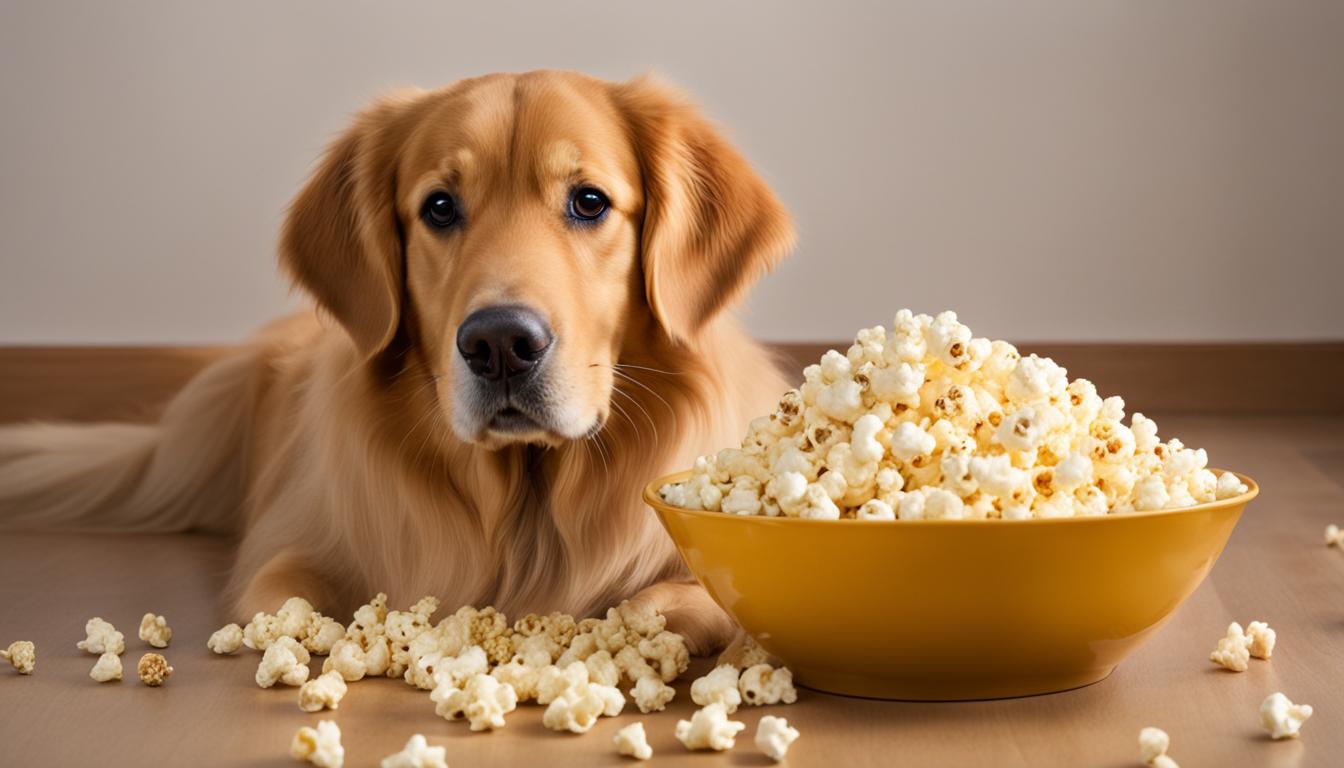
Leave a Reply